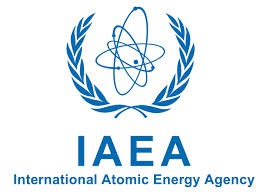 IAEA logo
IAEA logo
The International Atomic Energy Agency (IAEA), has met with key Agencies of the Ghana Nuclear Power Programme Organisation (GNPPO) in Vienna, Austria, to discuss the gaps in the roadmap of the country’s Nuclear Power Programme (NPP) Agenda.
The draft roadmap document, which stretches from pre-feasibility studies, to the commissioning of the first nuclear power plant spans over the medium term period.
Professor Benjamin Jabez Botwe Nyarko, Director-General of the Ghana Atomic Energy Commission, in an address at the on-going meeting, said the roadmap for the NPP has been drafted, following recommendations by IAEA experts on a visit to Ghana early this year.
He said the aim of the experts was to develop a better understanding of the planning for a nuclear power infrastructure development, in order to prepare a response to a request from the country for a national project in the 2016-17 Technical Committee (TC) cycle.
He thanked the IAEA for the opportunity given and for sharing their knowledge and expertise, and said, the meeting would create the platform for the experts to review and advice Ghana’s team on the draft roadmap for the nuclear power programme, and also provide training on the IAEA self-evaluation methodology in preparation for an integrated infrastructure review mission.
Among the GNPPO member Agencies present at the meeting, which also doubles as the Nuclear Power Programme Implementing Organisation (Ghana’s NEPIO), were the Ghana Atomic Energy Commission (GAEC), the Ministry of Power (MoP), the Volta River Authority, an (electricity generating body), the Nuclear Regulatory Authority, and the Nuclear Power Institute of GAEC.
Prof. Nyarko said activities done and discussed so far shows that Ghana was an active First Phase country according to the IAEA’s generic roadmap for nuclear power development.
He said the GNPPO has made presentations on the National Roadmap and also on IAEA-based self-evaluation activities that had being undertaken.
The meeting has also seen both sides discussing extensively, the nineteen infrastructural issues of developing a national nuclear power programme.
He recounted how the Cabinet of the republic of Ghana in 2007, set up a Committee to advise the Government on the potential use of nuclear energy for power generation in Ghana.
He said following the Committee’s report and recommendation, a decision was taken to add nuclear energy into the country’s energy mix, as a long term energy option, and which was later documented in Ghana’s Energy Policy in March 2010.
He said the GNPPO was then established in September 2012, to coordinate and manage the infrastructure development of the nuclear power programme and subsequently, various activities have been set in progress with regards to meeting the IAEA Milestone.
Prof. Nyako said IAEA expert’s on their visit to the country recommended that the current TC project and any future national projects for nuclear power, should be focused on Ghana’s near term goals of the nuclear power infrastructure development programme, and Agency support should be linked to the country’s national activities.
It also called for a national position in the form of a policy document and a roadmap or national action plan to be developed with timelines and targets for key deliverables; and that, the coordination mechanisms for nuclear power infrastructure should be strengthened.
He said the experts also called for clearly defined roles and responsibilities of the organizations participating in the programme, and a common understanding of the national position developed